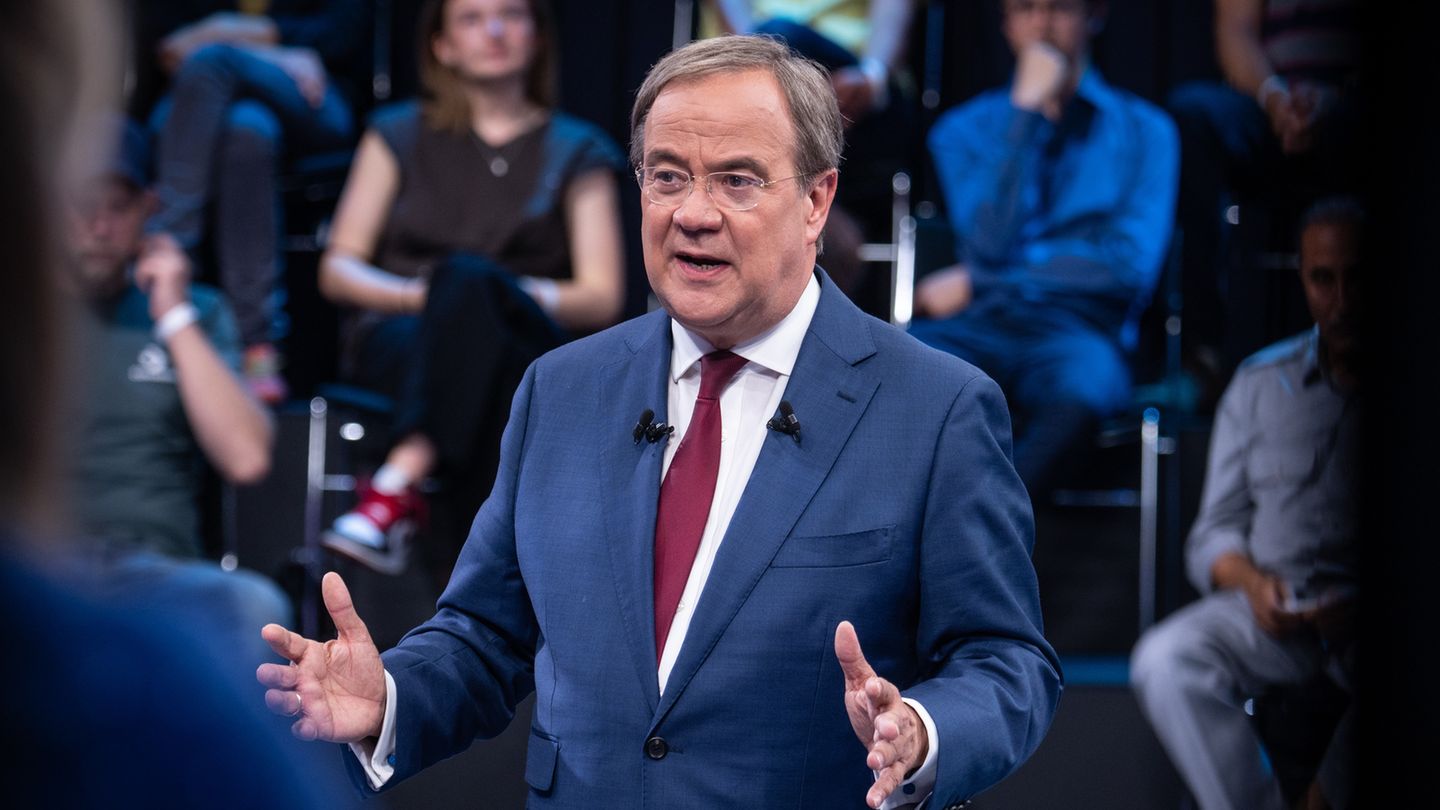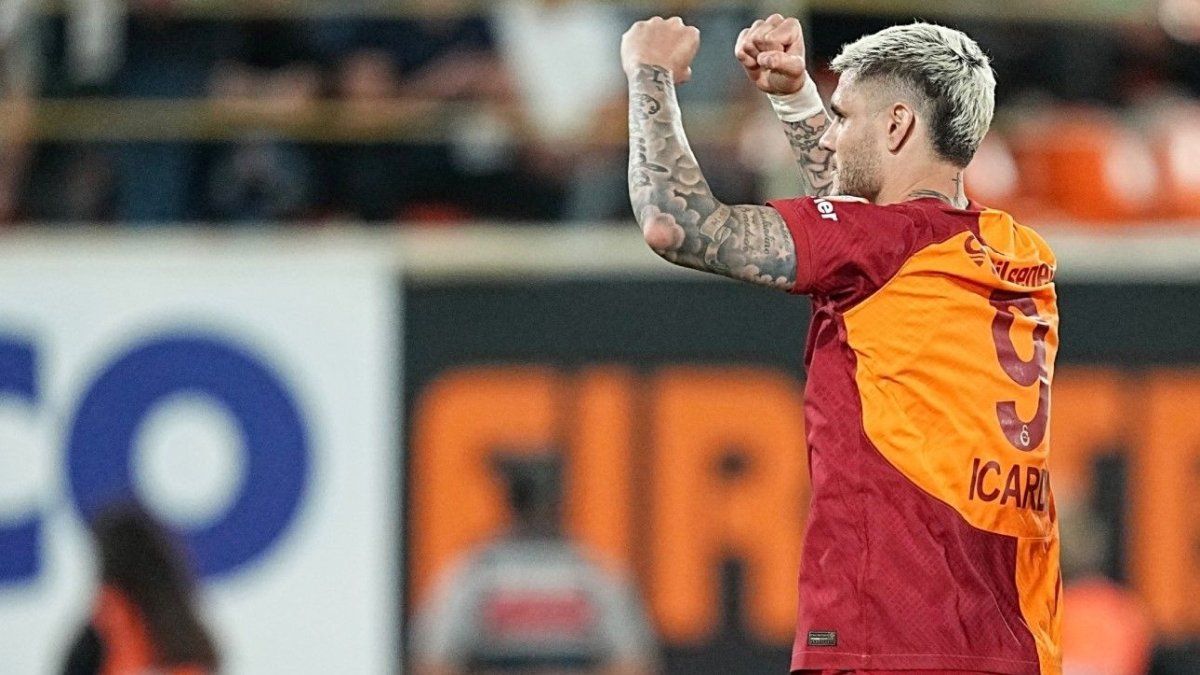In difficult election campaign times, Armin Laschet answers pressing questions from voters on ZDF. The otherwise jovial Rhinelander seems strangely withdrawn. The last few weeks have left their mark.
There he stands now, the friendly little man from Aachen who initially believed he was on the safe path to the Chancellery. Armin Laschet is supposed to speak “plain text” on ZDF, convincing voters in direct contact, where he has so far not been able to convince in the election campaign as a candidate for chancellor from the CDU and CSU. In view of the disastrous survey results, another format of the Mainz broadcaster would be more suitable: “What now, Mr. Laschet?” But that already happened in April, when the CDU chief had just been chosen as candidate for chancellor. It was such a much better time for him from today’s perspective.
Everything is different now. Even in his own state of North Rhine-Westphalia, competitor Markus Söder sometimes has better personal survey results than Laschet, the Prime Minister. Söder and the “friends” from Bavaria are audibly at a distance, sharpening their knives for Laschet’s appearance at the CSU party convention next Saturday. And then the broadside from the Cologne administrative court: The evacuation of the protest camps against coal mining in the Hambach Forest, forced by the NRW state government, was illegal. There are only two things that speak for the 60-year-old: He is a stand-up man. Whether prime minister, CDU chairman or candidate for chancellor – he always took office from a seemingly hopeless situation. And: Rhinelander Laschet gets on well with people, with his sociable nature he quickly finds access – sometimes so much that the purpose of a campaign meeting is sometimes forgotten.
Armin Laschet adheres to a conservative family image
Such a round in direct exchange with voters should therefore suit the CDU candidate. But the bad election campaign has obviously left its mark. Laschet cannot completely get out of his skin, but he noticeably throttles his manner, which has been criticized more often as too jovial in the past few weeks – again coming over clumsy, again laughing in the wrong place like in the floodplain (for which he apologizes again), again are supposedly misunderstood, the time until election day is gradually too short. But the thing has a downside: Laschet, who has been withdrawn in this way, hardly takes any interest in the fate of a long-covid sufferer in the studio and amazes with the statement that one has to be aware of some “that it exists”. After all, he wants to check whether the approval of an allegedly promising drug can be accelerated. The answer to a mayor who was exposed to hatred and agitation is also strangely distant. “Local politicians are people who are directly with the citizens,” he explains to the local politician about her own situation and averted his gaze from her.
At one point Laschet gets completely out of step. When a lawyer living in same-sex marriage wants to know why she is not recognized as the parent of her wife’s child, while that would be perfectly fine with a man who is not the father of the child, the conservative cannot hide the fact that he is the traditional one Family picture is firmly attached. But he does not say that, instead tries to mix questions of adoption law into the subject, speaks of “your construction” instead of your family, until the questioner points out to him that it is an unconstitutional situation and that the CDU must finally move, “if you still want to be elected by families in the future”. Laschet surrenders, smiles tiredly, just says: “Good.”
Long explanations, rarely plain text
Although the title of the show calls for “clear text”, it is rarely used. With almost all questions, the CDU politician indulges in a description of the status quo. “You have to explain the problem first,” says Laschet. He almost always shows understanding, but he does not tell the threatened and harassed local politician how he wants to enforce the “zero tolerance” he advocates better than before. He promises the policeman, who sees himself exposed to hostility, that he will have the backing of politics and new equipment – but without being specific. The chancellor candidate replied: “I have the impression that the police are taking action.” Otherwise disturbances of the peace are a matter for the public order office.
He replies to a call center employee who complains that the current minimum wage does not allow them to participate in social life: “If you work for a minimum wage all your life, that’s not enough for an adequate pension, that’s right.” Laschet apparently does not want to work to ensure that this changes. The wages are a matter for the unions and the employers, if politics interferes, “it is bad for the unions.” For the questioner, there might be a chance for another job. He finds Laschet’s answer to his question “vague and unsatisfactory”.
Clear commitment against the AfD
And so it goes on: A woman affected by the flood learns a lot about accelerated committee and legislative work, about the alleged attempt to get craftsmen “alongside the election campaign”, but does not hear a word of regret about her situation and only little about possibilities faster Everyday help that is urgently needed. Even a man from Afghanistan who worries about relatives who are hiding from the Taliban does not induce the candidate for chancellor to spontaneously promise help.
But Laschet also received spontaneous applause twice. Once for his plea for less bureaucracy: “It all takes far too long. That way we will neither achieve the energy transition nor remain competitive.” And a second time with the sentence that it must remain with the coal phase-out in 2038, “because if you change the number every year, you lose confidence in politics.” Contrary to criticism expressed, he believes it is possible to achieve the 1.5-degree climate target with the CDU program, but this cannot be predicted exactly yet. But: “If we manage to reorganize the industry, we will have fewer CO2 emissions again.” But what if not?
The CDU candidate became very clear on one point: he would not talk to the AfD, would not cooperate and would not form a coalition. “A right-wing extremist party that incites against others has no place in German parliaments,” said Laschet. He did not want to accept the objection that he was dividing with this statement. “I don’t want to have anything to do with them, that’s my opinion, I can express that.” One can be critical without immediately becoming right-wing extremist. Listening to the matter and talking to each other, but that must remain possible if the opinions are far apart. You can still hear him out there, the friendly man from Aachen. “Let’s just wait and see what the voters decide in 17 days,” he doesn’t want to talk about coalitions in the end. This election campaign has not left him without a trace.
David William is a talented author who has made a name for himself in the world of writing. He is a professional author who writes on a wide range of topics, from general interest to opinion news. David is currently working as a writer at 24 hours worlds where he brings his unique perspective and in-depth research to his articles, making them both informative and engaging.




